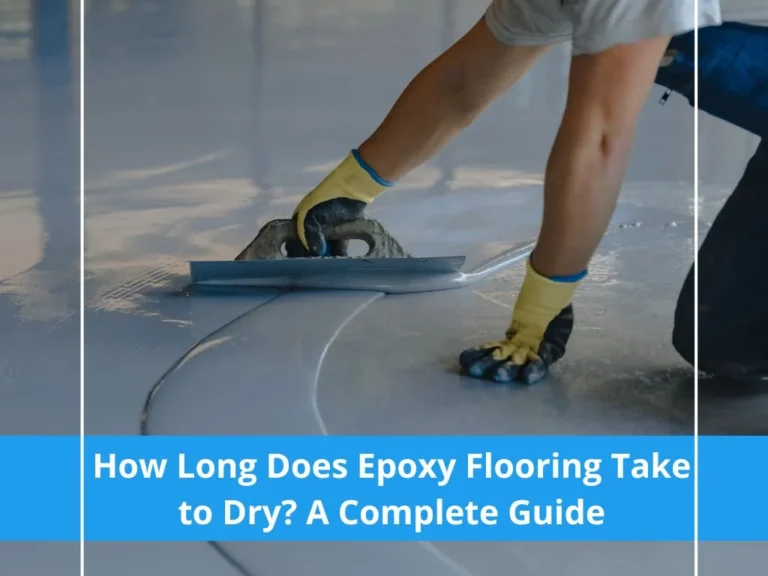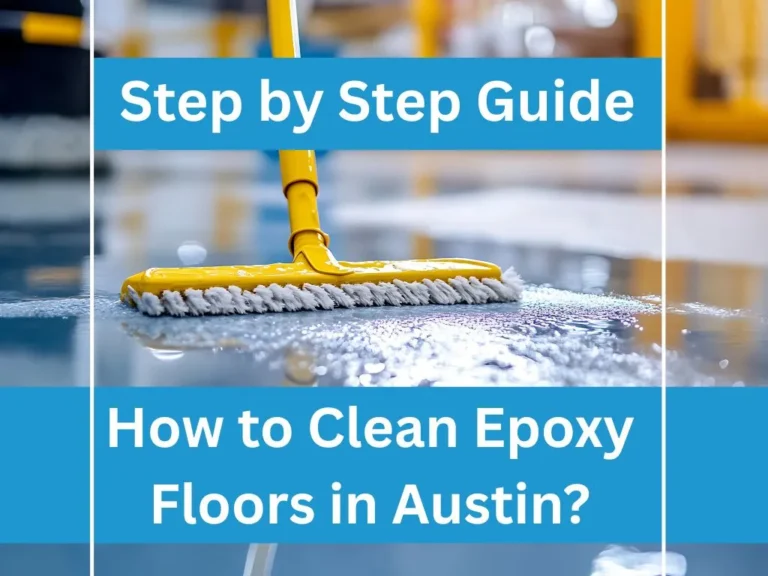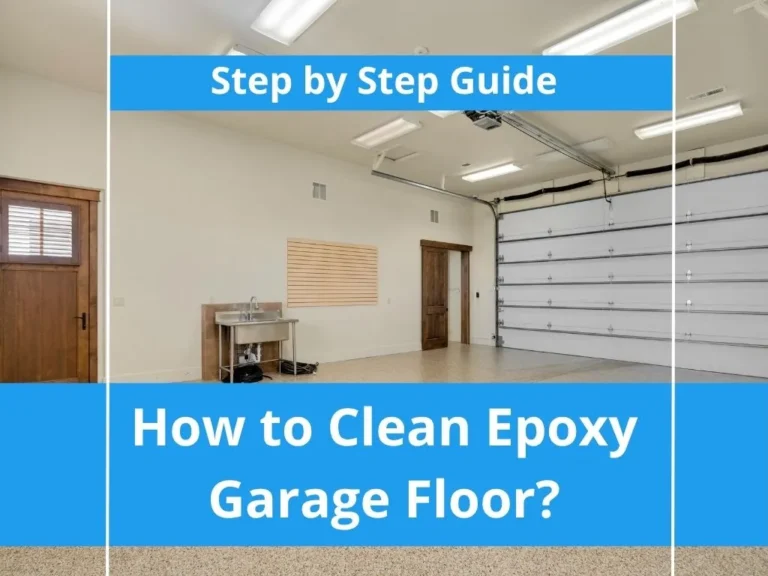How Long Does Epoxy Floor Last? Full Comparison
You’ve seen those gorgeous epoxy-coated floors on Pinterest. Maybe your neighbor just got one installed. Now you’re wondering—how long does an epoxy floor last? It’s a smart question, especially when you’re about to invest thousands into your floor. The good news? Epoxy flooring can last decades (From 10 years to 30 years) if you treat it right. Let’s break down everything you need to know about epoxy floor lifespan so you can make the best decision for your space.
What’s the Lifespan of Epoxy Flooring?
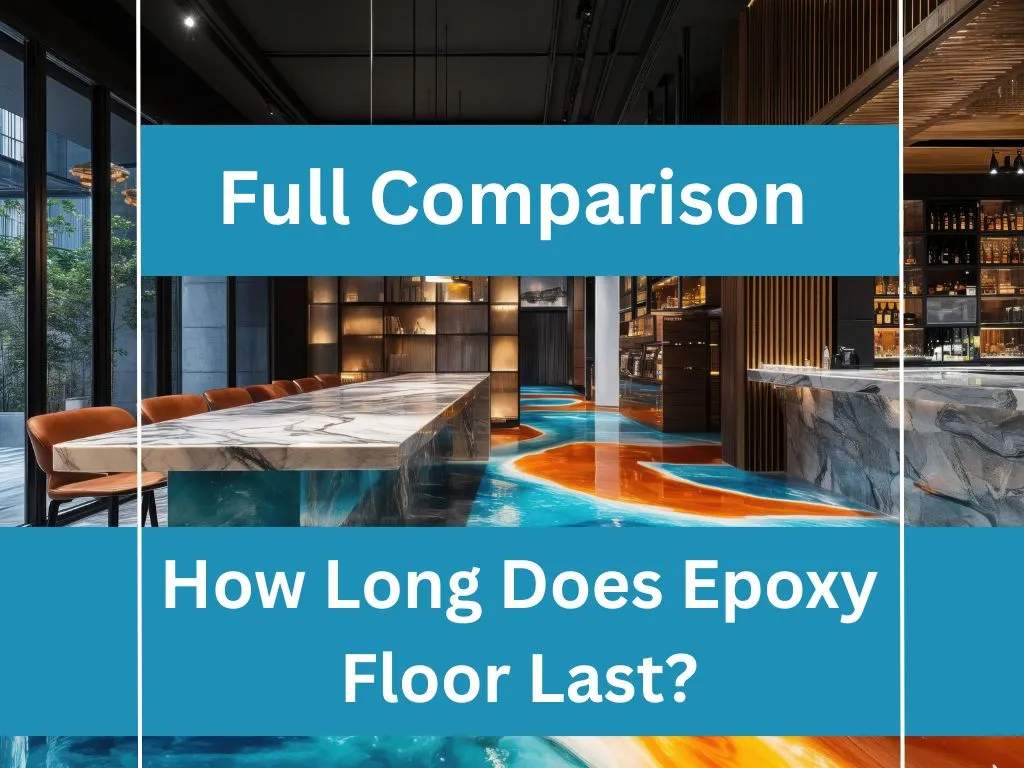
Most epoxy floors last between 10 and 20 years in homes, while commercial spaces typically see 5 to 10 years. The difference ultimately depends on the level of wear and tear the floor has experienced. Your home garage gets parked in twice a day. A warehouse? That’s forklifts, pallet jacks, and constant foot traffic. Here’s the thing, though—I’ve seen residential epoxy floors that are 25 years old and still looking sharp. It’s all about installation quality and how you care for it.
How Long Does Epoxy Flooring Last?
Let’s be clear about the life of epoxy flooring:
- Home Garages: You’re looking at 15 to 20+ years easily. Some homeowners report their floors still looking great after 25 years with basic maintenance.
- Retail Stores and Offices: Usually 5 to 10 years, depending on foot traffic. A busy restaurant kitchen will wear faster than a boutique clothing store.
- Warehouses and Factories: Around 5 to 8 years under chemical disclosure and heavy machinery. That’s still impressive considering what these floors endure.
- Basements and Indoor Spaces: Often 20+ years or more since they’re not dealing with vehicles, hot tires, or extreme temperature changes.
Compare that to painted concrete, which starts chipping after just 1 to 3 years. Or even sealed concrete, which needs resealing every few years. Epoxy wins hands down when it comes to longevity. The catch? Installation matters. A professional job lasts way longer than a DIY weekend project.
What is an Epoxy Floor?
Epoxy isn’t just fancy paint—it’s actually a chemical reaction happening on your floor. You mix 2 parts: resin and hardener. Once they combine, they create this incredibly tough plastic coating that bonds right into your concrete.
The cool part is how it works. Regular paint sits on top of concrete like a blanket. Epoxy actually penetrates and grabs onto the concrete surface. That’s why it doesn’t peel off like paint does.
You’ll find epoxy everywhere these days. Garages, obviously. But also commercial kitchens, hospital hallways, auto showrooms, warehouse floors, and even high-end homes. It handles spills, resists stains, and can take a beating.
And the looks? You’ve got options. Solid colors if you want clean and simple. Metallic finishes that look like liquid metal. Or decorative flakes that add texture and hide dirt.
One more thing—thickness makes a huge difference. Professional epoxy coatings are often 10 to 20 times thicker than regular floor paint. That extra thickness is what gives you those extra years of durability.
7 Factors That Influence the Epoxy Coating Life
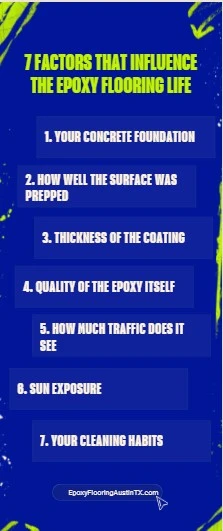
1. Your Concrete Foundation
Everything starts here. If your concrete is weak or crumbly, the best epoxy in the world won’t save it. Professional installers look for concrete with at least 3,000 PSI strength.Anything less is asking for trouble, especially if you’re parking autos or storing heavy equipment.
2. How Well the Surface Was Prepped
This is crucial. I cannot emphasize this enough: your concrete must be perfectly clean, completely dry, and entirely free of oil, grease, and old coatings. Professionals often grind or acid-etch the surface to create the ideal texture for bonding. If you miss this step or hurry through it, your floor may start peeling within a year.
3. Thickness of the Coating
Thicker equals longer-lasting. Industrial floors get coatings that are 0.4mm to 1.0mm thick. Home garages can go thinner since they don’t face the same punishment. But if you’re running a workshop or parking heavy trucks, spring for the thicker application.
4. Quality of the Epoxy Itself
Not all epoxy is created equal. Those DIY kits from the hardware store? They’re basically glorified paint. Professional-grade epoxy costs more upfront, but it resists yellowing, chemicals, and wear way better. It’s the difference between replacing your floor in 5 years versus 20.
5. How Much Traffic Does It See
A garage that stores your weekend classic car will last longer than one with daily SUV traffic, oil changes, and DIY projects every weekend. More use means faster wear. That said, quality epoxy handles daily life just fine.
6. Sun Exposure
UV rays are epoxy’s enemy. Direct sunlight causes fading and chalking over time. This is why epoxy works best indoors. Planning to coat an outdoor patio? You’ll want to add a UV-resistant topcoat to protect your investment.
7. Your Cleaning Habits
Dirt and grit are easily manageable factors. They wear down your floor like sandpaper. Sweep regularly, mop when needed, and your floor lasts years longer. Neglect it, and even the best professional installation will show wear faster than it should.
How to Increase the Life of Your Epoxy Floor
Keep It Clean
Sounds basic, but it works. Sweep or vacuum once a week to get rid of dirt and debris. Mop monthly with a gentle cleaner. Nothing fancy needed—just regular maintenance goes a long way.
Throw Down Some Mats
Put mats at entry points, especially if they lead outside.They catch moisture and dirt before it can be followed to your floor. Small investment, big payoff.
Protect Against Hard Hits
Epoxy is tough, but it’s not indestructible. Use padding under tool chests or heavy equipment. If you drop a transmission or a barbell from chest height, you might chip it. Prevention beats repair every time.
Clean Spills Fast
Oil, gasoline, brake fluid—clean them up right away. Epoxy resists stains well, but leaving chemicals sitting for days isn’t great.Regularly wiping down your floor helps maintain its new appearance.
Add a Fresh Coat Every 5-10 Years
When your floor starts looking a bit tired, consider adding a new topcoat. It’s like a refresh button for your epoxy. You’re not replacing everything—just adding a protective layer. Way cheaper than starting over.
Skip the Harsh Chemicals
Bleach and cleaners that contain ammonia can break down epoxy over time. Stick to pH-neutral cleaners made for sealed floors. Your floor will thank you.
When to Replace Epoxy Flooring? 5 Factors
You’re Seeing Cracks
Small cracks can spread like a windshield chip. Once you see spider-web patterns forming, it’s time to think about replacement. Cracks expose the concrete underneath to moisture and damage.
The Coating is Peeling or Bubbling
If edges are lifting or you see bubbles forming, the bond has failed. This usually means there was a moisture problem or the installation wasn’t done right. Once peeling starts, it spreads fast.
Worn-Through Spots
High-traffic areas showing concrete through the epoxy? That’s your floor waving the white flag. Once the coating is gone, stains and moisture can reach the concrete base.
Major Color Changes
Some fading is normal over many years. But if your floor has yellowed badly or the color has changed completely, that’s UV damage or chemical breakdown. If cleaning doesn’t restore it, then it’s time to move on.
The Concrete Has Issues
If the foundation develops major cracks or settlement problems, you need to fix that first. No coating can hide structural problems. Address the root cause, then refinish.
Don’t wait until your floor is completely trashed. Catching problems early often means you can recoat instead of completely redoing. That saves you money and hassle.
Conclusion
So, how long does an epoxy floor last?With correct installation and proper maintenance, you can expect a lifespan of at least 10 to 20 years, often extending much longer. The floors that make it past 20 years all have three things in common: quality materials, professional installation, and regular maintenance.
Your garage, basement, or workspace deserves a floor that performs for decades. Not something you’re redoing every few years. The difference between a 5-year floor and a 25-year floor often comes down to those initial choices—who installs it, what products they use, and how you care for it.
Ready for a Floor That Actually Lasts?
Stop dealing with stained, cracking concrete. Get a professional epoxy floor that’s built to last. Contact us now for a free estimate. We’ll assess your space and show you exactly what’s possible.
